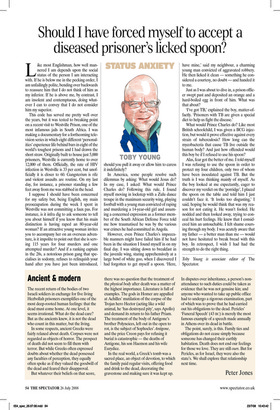Ancient & modern
The recent return of the bodies of two Israeli soldiers in exchange for five living Hezbollah prisoners exemplifies one of the most deep-rooted human feelings: that the dead must come home. At one level, it seems irrational. What do the dead care? But as the ancients knew, it is not the dead who count in this matter, but the living.
In some respects, ancient Greeks were fairly relaxed about death. Corpses were not regarded as objects of horror. The prospect of death did not seem to fill them with terror. But while Greeks often expressed doubts about whether the dead possessed any faculties of perception, they equally often spoke as if they valued the goodwill of the dead and feared their disapproval.
But whatever their beliefs on that score, there was no question that the treatment of the physical body after death was a matter of the highest importance. Literature is full of examples. The gods in Homer are appalled at Achilles’ mutilation of the corpse of the Trojan hero Hector (acting like a wild animal, he ‘has destroyed pity’, says Apollo) and demand its return to his father Priam. The treatment of the body of Antigone’s brother Polyneices, left out in the open to rot, is the subject of Sophocles’ Antigone, and the price Creon pays for refusing it burial is catastrophic — the deaths of Antigone, his son Haemon and his wife Eurydice.
In the real world, a Greek’s tomb was a sacred place, an object of devotion, to which the family paid regular visits, offering food and drink to the dead, decorating the gravestone and making sure it was kept up. In disputes over inheritance, a person’s nonattendance to such duties could be taken as evidence that he was not genuine kin; and anyone who wanted to take up public office had to undergo a rigorous examination, part of which was to prove that he had carried out his obligations to the dead. Pericles’ ‘Funeral Speech’ (43 BC) is merely the most famous example of a speech made annually in Athens over its dead in battle.
The point, surely, is this. Family ties and obligations do not cease simply because someone has changed their earthly habitation. Death does not end our feelings for those we love. They are still ours. But for Pericles, as for Israel, they were also the state’s. We shall explore that relationship next time.
Peter Jones


























































 Previous page
Previous page